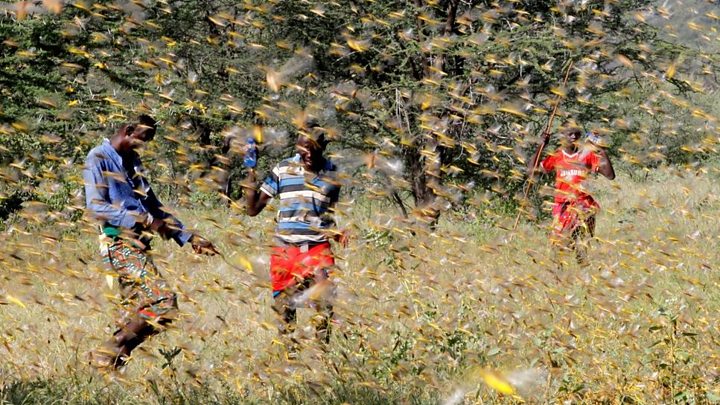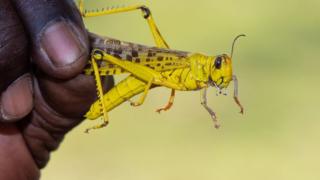The East African region could be on the verge of a food crisis if huge swarms of locusts devouring crops and pasture are not brought under control, a top UN official has told the BBC.
A massive food assistance may be required, Dominique Burgeon, director of emergencies for the UN’s Food and Agriculture Organisation (FAO), said. Ethiopia, Somalia, Kenya, Tanzania and Uganda are affected.
Efforts to control the infestation have so far not been effective. Aerial spraying of pesticides is the most effective way of fighting the swarms but countries in the region do not have the right resources.
There are fears that the locusts – already in the hundreds of billions – will multiply further. The FAO says the insects are breeding so fast that numbers could grow 500 times by June.
The UN body has now called on the international community to provide nearly $76m (£58m) to fund the spraying of the affected areas with insecticide.
“If it doesn’t, the situation will deteriorate and then you will need to provide massive food assistance for a humanitarian situation that may even get out of control,” Mr Burgeon said.
“There is always a risk when you have people in acute food insecurity that famine is not very far,” he added. An FAO spokesperson later clarified that they were not warning about a famine but rather “food insecurity”.

What is a famine?
The word famine is used to describe a hunger crisis at its worst.
Famine is the most serious of five phases that are used by the UN and most aid agencies.
Certain requirements have to be met for a situation to be called a famine. These include:
- At least 20% of the population doesn’t have enough food for the average person to lead a healthy life (2,100 kilocalories a day)
- There is acute malnutrition in more than 30% of children
- There are two deaths per 10,000 people every day, or four child deaths per 10,000 children every day

The locust invasion is the worst infestation in Kenya for 70 years and the worst in Somalia and Ethiopia for 25 years.
Somalia has declared a national emergency in response to the crisis.

The Ethiopian government has called for “immediate action” to deal with the problem affecting four of the country’s nine states.
Kenya has deployed aircrafts to spray pesticides in several regions, while Uganda plans to send soldiers to northern regions to spray the affected areas. The locusts are thought to have spread from Yemen three months ago.
























